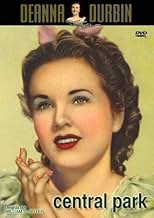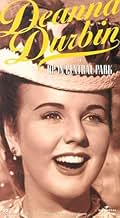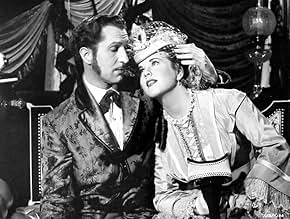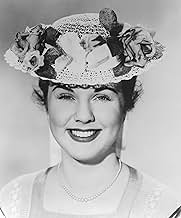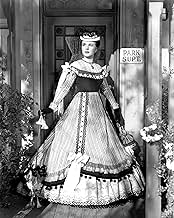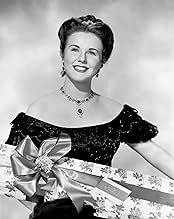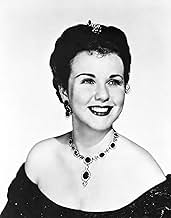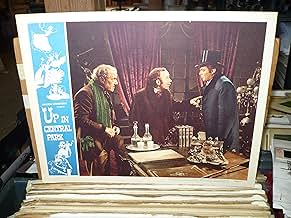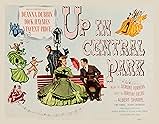CALIFICACIÓN DE IMDb
6.0/10
280
TU CALIFICACIÓN
Agrega una trama en tu idiomaA newspaper reporter and the daughter of an immigrant maintenance man help expose political corruption in New York City.A newspaper reporter and the daughter of an immigrant maintenance man help expose political corruption in New York City.A newspaper reporter and the daughter of an immigrant maintenance man help expose political corruption in New York City.
- Dirección
- Guionistas
- Elenco
Nellie Fisher
- Dancer
- (as Nelle Fisher)
Boyd Ackerman
- Policeman
- (sin créditos)
Patricia Alphin
- Guest
- (sin créditos)
Alice Backes
- Swedish Immigrant Girl
- (sin créditos)
G. Pat Collins
- Ward Heeler
- (sin créditos)
Opiniones destacadas
UP IN CENTRAL PARK (Universal-International, 1948), directed by William A. Seiter, stars Deanna Durbin in her next to last movie of her career. For her first 1948 release, she stars in a light-hearted period piece based on a popular 1945 musical play of the same name by Dorothy and Herbert Fields. Aside from some changes from stage to screen regarding both story and selected song tunes, the film in general is livably typical Durbin material which allows her to change from teenage Irish girl in pig-tails to attractive young woman. What's most interesting here is casting Durbin opposite Vincent Price (then not quite the horror film actor he was to become years later) in his rare occasion cast in a musical story. Though Price would have done very well in the singing category, all major vocals go to the pleasing voices by Durbin and 20th Century-Fox alumni, Dick Haymes.
In spite of the title, the 88 minute story is not set entirely in Central Park. However, it takes place in 1870s New York City where the plot introduces William Marcy Treed (Vincent Price), a corrupt political boss of the Tammany Hall Society advocating the re- election of weak and drunken candidate, Mayor Oakley (Hobart Cavanaugh,) back in office so to resume his crooked deals. Going against Treed is New York Times reporter John Matthews (Dick Haymes) out to expose him, but because of his lack of evidence that would stand up on court, he's unable to do so. Later on a boat arriving from Europe to Ellis Island are immigrants, including that of Rosie (Deanna Durbin) and her widower father, Timothy Moore (Arthur Sharpe) coming to their land of opportunity where Rosie hopes to become a great opera singer. Soon after, Mr. Moore is met by Regan (Tom Powers), one of Tweed's associates offering naive immigrants extra money voting straight candidate tickets under names of those unable to cast a ballot, namely the sick and deceased, even without being American citizens. Offered $2 a vote, Mr. Moore earns $50 for voting 23 times for Oakley. Having fallen asleep in Tweed's office while awaiting to meet with him, Treed, believing Rosie has overheard him discussing with the board about embezzling funds through unnecessary renovation of Central Park, gets on her good graces by offering her father a $3,000 a year job as park superintendent plus living accommodations inside Central Park. As much as Rosie feels Tread to be a great man of honor, it's up to Matthews, who has taken an interest in the young lady, to convince her otherwise.
With music and lyrics by Sigmund Romberg and Dorothy Fields, the motion picture soundtrack is as follows: "Vote for Treed" (sung by candidates); "Oh Say Do You See What I See" (sung by Deanna Durbinb); "Carousel in the Park" (sung by Dick Haymes and Deanna Durbin); "The Ice Skating Ballet" (photograph come to life sequence choreographed by Helen Tamiras); "When She Walks in the Room" (sung by Dick Haymes); "Pace, Pace Mio Mio" and Giuseppe Verdi's Opera LA FORZE DEL DESTINO (sung by Durbin); and "The Waiter/Can-Can Dance" (instrumental). Though the songs are proved satisfactory, including Durbin's "Oh Say Do You See" number and a couple of Dick Haymes song interludes, they are, in the most part, unmemorable.
While the legacy of Universal Studio rests mostly on its reputation for horror films and/or Abbott and Costello comedies, one of the biggest money makers for the studio since 1936 were those films starring Deanna Durbin. Making no attempt speaking with an Irish brogue, which is left to the Barry Fitzgerald sounding voice of co-star, Arthur Sharpe, Durbin's Rosie is less typical Irish stereotype than most, though her Irish temper does flare up on a couple of occasions with her giving face slaps to those who make her angry. When watching Durbin playing opposite Vincent Price, one would have to feel their missed opportunity for not being cast together in the sound remake of THE PHANTOM OF THE OPERA (1943), in place of the casting of Susanna Foster and Claude Rains. Interestingly with this combination for UP IN CENTRAL PARK that Price presence gathers the most attention with his scene stealing performance, while Arthur Sharpe gets some moments to himself in a scene where he attempts to get his education by learning to read by attending school seated in a classroom surrounded by third grade students.
A satisfactory presentation with authentic recreated costumes and settings that blend in perfectly with its time frame, it's a wonder why it wasn't produced in Technicolor. Though UP IN CENTRAL PARK did have some limited TV revivals in the 1980s, especially on public broadcasting television, it did become available on video cassette in 1998 and years later on DVD as part of the Deanna Durbin collection, simply indicating the Durbin name isn't as unknown or forgotten as legend may have it believed to be. (***)
In spite of the title, the 88 minute story is not set entirely in Central Park. However, it takes place in 1870s New York City where the plot introduces William Marcy Treed (Vincent Price), a corrupt political boss of the Tammany Hall Society advocating the re- election of weak and drunken candidate, Mayor Oakley (Hobart Cavanaugh,) back in office so to resume his crooked deals. Going against Treed is New York Times reporter John Matthews (Dick Haymes) out to expose him, but because of his lack of evidence that would stand up on court, he's unable to do so. Later on a boat arriving from Europe to Ellis Island are immigrants, including that of Rosie (Deanna Durbin) and her widower father, Timothy Moore (Arthur Sharpe) coming to their land of opportunity where Rosie hopes to become a great opera singer. Soon after, Mr. Moore is met by Regan (Tom Powers), one of Tweed's associates offering naive immigrants extra money voting straight candidate tickets under names of those unable to cast a ballot, namely the sick and deceased, even without being American citizens. Offered $2 a vote, Mr. Moore earns $50 for voting 23 times for Oakley. Having fallen asleep in Tweed's office while awaiting to meet with him, Treed, believing Rosie has overheard him discussing with the board about embezzling funds through unnecessary renovation of Central Park, gets on her good graces by offering her father a $3,000 a year job as park superintendent plus living accommodations inside Central Park. As much as Rosie feels Tread to be a great man of honor, it's up to Matthews, who has taken an interest in the young lady, to convince her otherwise.
With music and lyrics by Sigmund Romberg and Dorothy Fields, the motion picture soundtrack is as follows: "Vote for Treed" (sung by candidates); "Oh Say Do You See What I See" (sung by Deanna Durbinb); "Carousel in the Park" (sung by Dick Haymes and Deanna Durbin); "The Ice Skating Ballet" (photograph come to life sequence choreographed by Helen Tamiras); "When She Walks in the Room" (sung by Dick Haymes); "Pace, Pace Mio Mio" and Giuseppe Verdi's Opera LA FORZE DEL DESTINO (sung by Durbin); and "The Waiter/Can-Can Dance" (instrumental). Though the songs are proved satisfactory, including Durbin's "Oh Say Do You See" number and a couple of Dick Haymes song interludes, they are, in the most part, unmemorable.
While the legacy of Universal Studio rests mostly on its reputation for horror films and/or Abbott and Costello comedies, one of the biggest money makers for the studio since 1936 were those films starring Deanna Durbin. Making no attempt speaking with an Irish brogue, which is left to the Barry Fitzgerald sounding voice of co-star, Arthur Sharpe, Durbin's Rosie is less typical Irish stereotype than most, though her Irish temper does flare up on a couple of occasions with her giving face slaps to those who make her angry. When watching Durbin playing opposite Vincent Price, one would have to feel their missed opportunity for not being cast together in the sound remake of THE PHANTOM OF THE OPERA (1943), in place of the casting of Susanna Foster and Claude Rains. Interestingly with this combination for UP IN CENTRAL PARK that Price presence gathers the most attention with his scene stealing performance, while Arthur Sharpe gets some moments to himself in a scene where he attempts to get his education by learning to read by attending school seated in a classroom surrounded by third grade students.
A satisfactory presentation with authentic recreated costumes and settings that blend in perfectly with its time frame, it's a wonder why it wasn't produced in Technicolor. Though UP IN CENTRAL PARK did have some limited TV revivals in the 1980s, especially on public broadcasting television, it did become available on video cassette in 1998 and years later on DVD as part of the Deanna Durbin collection, simply indicating the Durbin name isn't as unknown or forgotten as legend may have it believed to be. (***)
"Up in Central Park" is set in New York City in the 19th century. Boss Tweed (Vincent Price) and his political machine (Tammany Hall) have been in charge of the city for years...and cheating, graft and voting irregularities will keep him in power. At the time of the election, an Irish man and his daughter, Rosie (Deanna Durbin), arrive in the city...and are paid to vote the Tammany Hall candidates even though they aren't citizens. Tweed himself takes a special interest in them...mostly because he finds Rosie to be gorgeous. She, in turn, is smitten with him...unaware or perhaps unwilling to accept the man's evil reputation might just be true. A reporter (Dick Haymes) is fighting Tammany Hall and he tries to get Rosie to see the light...but getting her attitude to change will be a tall order, as around her he's the perfect gentleman. What's going to come of naive Rosie and Boss Tweed?
This is an enjoyable film but not without its problems. The first one I noticed was that although Rosie's dad has a thick Irish accent, Rosie sounds like a native-born American! She didn't even attempts a trace of the Irish accent...and it made little sense. The second was that even for a Durbin film the musical numbers were dull and too high brow...especially the ballet sequence. Third, and worst of all, the ending was very abrupt and unsatisfying. On the positive side, Vincent Price was great as the slimy Tweed and the story mildly interesting. But to me, the negatives slightly outweigh the positives.
This is an enjoyable film but not without its problems. The first one I noticed was that although Rosie's dad has a thick Irish accent, Rosie sounds like a native-born American! She didn't even attempts a trace of the Irish accent...and it made little sense. The second was that even for a Durbin film the musical numbers were dull and too high brow...especially the ballet sequence. Third, and worst of all, the ending was very abrupt and unsatisfying. On the positive side, Vincent Price was great as the slimy Tweed and the story mildly interesting. But to me, the negatives slightly outweigh the positives.
Not a bad film, in fact quite good, just a little underwhelming at the same time. It has a lot of things to like, there are a lot of omissions(We'll be close as Pages in a Book- though it's used as a cue at the end- and Fireman's Bride being the glaring omissions) but the music is still absolutely beautiful, the sprightly Oh Say, Can You See standing out. Pace, Pace Mio Dio from La Forza Del Destino is beautifully sung and is one of Verdi's best but most difficult soprano arias. The script is delightfully witty, and the story while not the most exceptional in the world is compelling. The choreography and dancing is professional and danced with elegance. In terms of scenes, Durbin's and Price's scenes are a joy but the highlight is the great Currier and Ives ballet. Deanna Durbin is just radiant and brings girlish naiveté to good effect, she's in great voice too, love the richness. Vincent Price is perfectly cast, while he's at his best in the menacing yet sympathetic roles he'd take on later it's easy to love how suave, handsome, smarmy and charismatic he is. Albert Sharpe is also good. Other than the omissions of some of the best songs of Up in Central Park or reducing them to musical cues, the scant length and Dick Haymes' at times likable but stiff performance(he does have a nice voice though and in all fairness his material is not as juicy as Durbin's and Price's), it's in the production values where Up in Central Park falls down most on. The costumes are fine, but the sets are rather stuffy and the use of locations are far too restricted, any opportunities of seeing the locations properly are not used to full effect and the likes of the zoo and carousel are only seen in as much as a few shots. In conclusion, a pleasant film and a good vehicle for Durbin(essentially what it was billed as)- though Price comes extremely close to stealing the show from under her- but at the same time it's disappointing. 6/10 Bethany Cox
As far as I know, this was the last time Deanna Durbin stood before the cameras (even though For The Love of Mary was released some months later, having been shelved for a while). She has gained a few extra pounds, but her voice has also gained weight: the one short operatic excerpt proves that she was becoming a proper soprano with rich, full, operatic voice. It's a pity she doesn't sing more in this film, and also a great pity she didn't pursue career in opera as she quit movies.
Why Universal didn't shoot this in full color and why they cast Dick Haynes, are beyond me. This shouldn't have been a project to save money with, but to spend spend spend! It's very well written and just plain interesting. The story runs smoothly and is quite multidimensional - you can understand most of the characters and their motives, and even the smooth villain becomes rather sympathetic once he explains his views on life to Deanna whom he really seems to cherish. But then again, Vincent Price is at his very best here, sexy and handsome as the Devil, and their scenes with Durbin are really sizzling, so one might turn a blind eye to his evil nature and be lulled into sleep by his silky voice and seductive manners. With Dick Haynes the things get to a halt - he's obviously miscast and seems rather uncomfortable. There's no electricity between him and Deanna.
This film would work well even as a straight picture. The musical numbers are only a few and even though not very memorable, they blend in well with the action. Not at all a bad pastime for Durbin / Price fans.
Why Universal didn't shoot this in full color and why they cast Dick Haynes, are beyond me. This shouldn't have been a project to save money with, but to spend spend spend! It's very well written and just plain interesting. The story runs smoothly and is quite multidimensional - you can understand most of the characters and their motives, and even the smooth villain becomes rather sympathetic once he explains his views on life to Deanna whom he really seems to cherish. But then again, Vincent Price is at his very best here, sexy and handsome as the Devil, and their scenes with Durbin are really sizzling, so one might turn a blind eye to his evil nature and be lulled into sleep by his silky voice and seductive manners. With Dick Haynes the things get to a halt - he's obviously miscast and seems rather uncomfortable. There's no electricity between him and Deanna.
This film would work well even as a straight picture. The musical numbers are only a few and even though not very memorable, they blend in well with the action. Not at all a bad pastime for Durbin / Price fans.
The dialogue and the overflowing production values of 'Up in Central Park' are two pleasurable surprises so many years afterwards to someone who is only just discovering the legacy of Deanna Durbin.
What never ceases to amaze me is the high standard of her films. They were, actually and in the flow of things, pretty run-of-the-mill, but the majority of them work incredibly well today, and 'Up in Central Park' is one of the most delightful. It has a magnificent script about a magnate, in actual fact a kind of dictator of New York City who whitewashes his money through Central Park, has the puppet mayor elected by bribing immigrants just off Ellis Island to vote in the names of dead constituents, and is just overall a very bad guy. He is played by Vincent Price, of course, soft-voiced, seductive and insinuating. An utter gentleman even at the end. "I wish more patriots like you would come to this country", he says, debonairly and hilariously. Deanna Durbin is the young Irish girl with dreams of becoming an opera star. She has just arrived in New York with her illiterate father who is given the position of superintendent of Central Park, because Vincent Price thinks his daughter overheard his evil plans for the city. Then enters young, ambitious reporter Dick Haynes with his lovely tenor voice, and he wants to bring the mighty down.
So we have young budding love, we have the older lecher, we have filial duty, and we have scathing political satire, believe me. "If you're strong enough to take something, it belongs to you", Vincent Price says, and the film takes him seriously as it well might, and the jokes aside Price's character is not too far off the mark.
The music is pleasant, the acting a sheer joy, and the pacing admirable.
What never ceases to amaze me is the high standard of her films. They were, actually and in the flow of things, pretty run-of-the-mill, but the majority of them work incredibly well today, and 'Up in Central Park' is one of the most delightful. It has a magnificent script about a magnate, in actual fact a kind of dictator of New York City who whitewashes his money through Central Park, has the puppet mayor elected by bribing immigrants just off Ellis Island to vote in the names of dead constituents, and is just overall a very bad guy. He is played by Vincent Price, of course, soft-voiced, seductive and insinuating. An utter gentleman even at the end. "I wish more patriots like you would come to this country", he says, debonairly and hilariously. Deanna Durbin is the young Irish girl with dreams of becoming an opera star. She has just arrived in New York with her illiterate father who is given the position of superintendent of Central Park, because Vincent Price thinks his daughter overheard his evil plans for the city. Then enters young, ambitious reporter Dick Haynes with his lovely tenor voice, and he wants to bring the mighty down.
So we have young budding love, we have the older lecher, we have filial duty, and we have scathing political satire, believe me. "If you're strong enough to take something, it belongs to you", Vincent Price says, and the film takes him seriously as it well might, and the jokes aside Price's character is not too far off the mark.
The music is pleasant, the acting a sheer joy, and the pacing admirable.
¿Sabías que…?
- TriviaDuring filming, sepia (brownish) tone was tested in a few scenes, but the released picture is entirely in standard black and white.
- ErroresWhen Timothy Moore is learning to read , he reads from Beatrix Potter's Tale of Peter Rabbit , which wasn't published until 1902 .
- Bandas sonorasOh Say, Can You See (What I See)
(uncredited)
Music by Sigmund Romberg
Lyrics by Dorothy Fields
Sung by Deanna Durbin
Selecciones populares
Inicia sesión para calificar y agrega a la lista de videos para obtener recomendaciones personalizadas
Detalles
- Fecha de lanzamiento
- País de origen
- Idioma
- También se conoce como
- Up in Central Park
- Locaciones de filmación
- Productora
- Ver más créditos de la compañía en IMDbPro
- Tiempo de ejecución1 hora 24 minutos
- Color
- Relación de aspecto
- 1.37 : 1
Contribuir a esta página
Sugiere una edición o agrega el contenido que falta

Principales brechas de datos
By what name was Quiéreme otra vez (1948) officially released in India in English?
Responda
